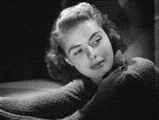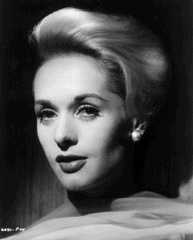The Other Leading Ladies in HITCH'S Life:
Few people in Hollywood worked so obsessively to create their ideal of female beauty as Hitchcock.
But as careful as Hitch was in cultivating the outward look of his leading ladies, he put even more energy into the shaping of their psyches.
From Joan Fontaine, to Ingrid Bergman, Grace Kelly and Tippi Hedren, Hitchcock molded each one of these very different women into a self-sacrificing persona that would do practically anything for love.To the extent that Hitchcock women are often degraded, tortured, and offer up their identities for the men they love, it would seem that Hitchcock would be the perfect whipping boy for male chauvinism amongst feminists. While this was the largely the case in the Sixties, now many feminist intellectuals rally around Hitchcock as their spokesman, saying Hitchcock accurately reflected the female point of view of their societal expectations in his films.
Writers like Tania Modleski and Camille Paglia, correctly point out that Hitchcock largely paints a female centered universe.
 The platonic infatuations Hitchcock held for his leading ladies are well documented in various biographies. The revelation that Ingrid Bergman was "madly in love with Hitch" is something he later confided to screenwriter David Freeman, while the two collaborated on the screenplay for his last and uncompleted project, The Short Night. Hitchcock died before the nearly completed screenplay could be filmed.
The platonic infatuations Hitchcock held for his leading ladies are well documented in various biographies. The revelation that Ingrid Bergman was "madly in love with Hitch" is something he later confided to screenwriter David Freeman, while the two collaborated on the screenplay for his last and uncompleted project, The Short Night. Hitchcock died before the nearly completed screenplay could be filmed.
Hitch&Alma shows how Grace Kelly became the symbol for everything Hitchcock sought to portray of woman within his cinema. Every indication was that he and Grace had an extremely cordial professional rapport that brought out the best in both of them.
Many years later, Jimmy Stewart completely dismissed any speculation about Hitchcock's emotional involvement with Grace Kelly. He said the three of them had planned to start a production company to make romantic comedies, and added, "How could Hitch not help but fall in love with Grace? Everyone loved her."
This writer does believe that Vertigo is a fable of personal lament, recounting Hitchcock's process creating Grace Kelly's persona and outer appearance, only to lose her to marriage to another man, and now having to recreate her by finding and reshaping a new leading lady. It's worth noting that Vertigo is one of the rare instances where Alma expressed dislike over one of his films.

It is interesting to compare Hitchcock's relation to Tippi Hedren to that of Picasso and Francoise Gilot. Both men were in their sixties deeply aware of their mortality, and perhaps abusing their power over a younger woman while trying to claim affection due.
Miss Hedren was a secure and professional actress, who diplomatically handled Hitch's tragic fixation with great aplomb while maintaining her self-respect. She has subsequently praised Hitchcock as being the greatest teacher any actress could ever want. Marnie and The Birds are among his most enduring contributions, and Miss Hedren's subtle performances in both are very human and dimensional. The assessment of Marnie as one of his weaker works has always baffled this writer.
To continue the Picasso/ Hitchcock analogy, Picasso's later work was cavalierly dismissed by the same art critics who were so enamored with his earlier work, and saw any departure from it as a letdown. Today, Picasso's last period is regarded as one of his best. This writer firmly believes the same reversal of opinion will occur with Hitchcock's later films, particularly Marnie.









No hay comentarios:
Publicar un comentario
Muchas Gracias